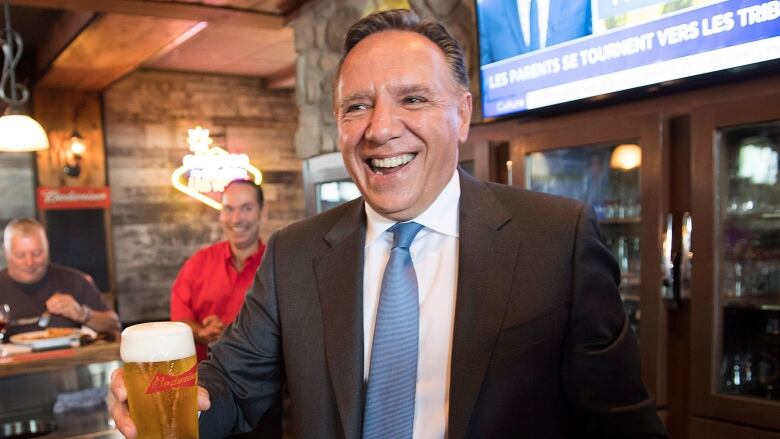Despite one good poll for the Liberals, the CAQ remains in control
What to make of a new poll suggesting a close race between the Liberals and the CAQ?

Is Franois Legault'sCoalition AvenirQubecthe undisputed frontrunner in the provincial election campaign, or is the CAQlocked in a tight, two-horse race with Philippe Couillard'sLiberals?
The CBC'sQuebec Poll Tracker still shows the CAQin a strong position, leading with 35.1 per cent of the vote against 29.2 per cent for the Liberals. Thatgap isn't particularly wide, but the CAQ's18-point lead among francophone voters would likely translate into a majority government for Legault if an election were held today.
But a survey published on Friday showed strong results for the Liberals, trailing the CAQ by a margin of only two points. The CROP/Cogeco poll put the Liberals at 36 per cent, the party's best result in any poll since the beginning of the year.
It's the kind of number that might give the Liberals hope. But it differs significantly from what three other pollsters have recorded in their most recent polls.
Surveys by Mainstreet Research, Ipsos and Lger have awarded the Liberals 26, 29 and 30 per cent support, respectively. The variation between those results isn't significant enough that it can't be explained by the normal sampling error that occurs in public opinion polling.
But the 36 per cent figure for the Liberals, recorded by CROP, stands apart. And it's not the first timethe polling company has found higher numbers for the party than others.
The Liberals have averaged 35 per cent in polls conducted by CROP in 2018, compared to 29 per cent in surveys conducted by other firms so far this year.
Methodology could be behind the difference.Other parties do not appear to be affected, perhaps because half of the difference is due to the higher support recorded for the Liberals among non-francophones. CROP assessed it at 75 per cent, while the other three pollsters averaged just 59 per cent.
One contributing factorcould be how pollsters treat parties other than the CAQ, Liberals, Parti Qubcois and Qubec Solidaire. Lger and Mainstreet, which allow respondents to choose the Conservatives and Greens, as well as ageneric "other party" (Lger also givesthe New Democrats as an option), pegged total support for these parties among non-francophones at 16 per cent on average.
Ipsos and CROP, which do not give multiple options for the smaller parties, found average support for "other parties" among non-francophones at just six per cent.
Different results, similar outcomes
While this has a big impact on the provincewidenumbers, it doesn't have much of an impact on what it would mean for the makeup of the National Assembly.
If we apply the Poll Tracker's seat projection model to these polls individually, the CAQends up with between 69 and 73 seats no matter which set of numbers are used. That is well over the 63-seat threshold for a majority government.
The CROP poll would give the Liberals a better outcome about 45 seats, compared to 35 to 40 seats in the other three polls but they would still be well out of range of retaining power. The model would project the Liberals having only a 13 per cent chance of winning the most seats using only the numbers from the CROP poll.
The problem is that Liberalsupport is not distributed in a way that helps the partywin seats.

The CROP poll put the Liberals 13 points behind the CAQoutside of the two metropolitan regions of Montreal and Quebec City, and 42 points behind in and around the provincial capital.
The Liberals did lead in Greater Montreal as a whole. But the party has few potential gains to make on the island of Montreal, where they hold a36-point lead over the CAQ.Theirthree-point deficit in the surrounding suburbs, incontrast, could cost them dearly.
The Liberals are in need of some good news as the campaign kicks off. While the CROP poll was conducted at about the same time as the other surveys, the resultspainta slightly rosier picture than what other surveys were suggesting when they were published earlier in the week.
Nevertheless, the contest isn't yet a two-horse race. The Liberals still have some more catching up to do before Oct. 1.
Sign up for our newsletter.We'll deliver everything you need to know about the Quebec election, directly to your inbox.












_(720p).jpg)


 OFFICIAL HD MUSIC VIDEO.jpg)
.jpg)



























































































